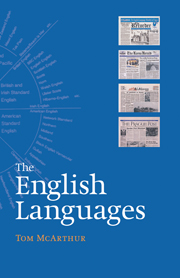Summary
English spoken; American understood.
(The Daily Chronicle, London, 10 June 1908)English and French spoken; Australian understood.
(a notice in Turkey, quoted in O. Hogue's Trooper Bluegum at Dardanelles, London, 1916)English understood?
Although the writers of the gems quoted above were essentially amusing themselves at other people's expense, they were also pointing to something signifkant that received little official or scholarly attention at the time. The early years of the twentieth Century were marked by the worldwide spread not only of English at large but also of an increasingly prestigious Standard English. As a result, more and more people throughout both the British Empire and the United States were sensitive to any perceived failure - individual or collective - to live up to that Standard. At the same time, the many marked differences in usage around the world had been obvious for decades, as demonstrated for example by comments from two writers in the 1880s, one from each side of the Atlantic:
o When I speak my native tongue in its utmost purity in England, an Englishman can't understand me at all.
(Sam Clemens (Mark Twain), The Stolen White Elephant, 1882)
o The American I have heard up to the present is a tongue as distinct from English as Patagonian.
(Rudyard Kipling, From Sea to Sea, 1889)
Wry hyperbole in both cases, certainly, but again, something serious behind the smile. If officialdom or the scholarly world in the late nineteenth Century commented on kinds of alienness and incomprehension inside English, it was usually to advocate more efficient schooling and a greater exposure to the language of schools and books, so that such defi ciencies might be reduced. By and large, the only English-speaking scholars of the period who took on diversity every day were the dialectologists, but they pursued their cataloguing and commentary under the vast shadow of standardization. As a result, they considered that, in the face of universal education, the dialects of the British and Irish islands and of North America were dying out, and so worked with a sense of urgency. Soon, they supposed, there would be nothing left to describe, apart from a few fossils embedded here and there in an otherwise smoothly Standard medium, a State of affairs which had been the dream of British and American opinion-formers since the eighteenth Century.
- Type
- Chapter
- Information
- The English Languages , pp. xiii - xxPublisher: Cambridge University PressPrint publication year: 1998



